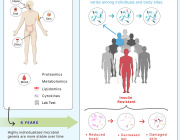
Butyrate in Human Health: Advancing Towards Clinical Applications for Gastrointestinal Diseases
Prof. Alain Stinzi from the University of Ottawa, Canada, will join the Targeting Microbiota 2025 Congress and will present his recent study on Butyrate in Human Health: Advancing Towards Clinical Applications for Gastrointestinal Diseases.
Prof. Alain Stintzi is a Professor in the Department of Biochemistry, Microbiology, and Immunology at the University of Ottawa and serves as the Director of the School of Pharmaceutical Sciences. His research focuses on microbial genomics, host-pathogen interactions, and the gut microbiome, particularly the role of butyrate in gastrointestinal health.
Prof. Stintzi's team aims to identify how human pathogens colonize the host's gastrointestinal tract. Although the pathogen remains the starting point of our research, we are also interested in the interactions between the pathogen and the host's endogenous intestinal microbial community. While classical microbiology seeks to understand the function of a gene or group of genes from a single microorganism, our holistic approaches aim to understand the role of all genes and how they contribute to the formation of a healthy microbial community. Specifically, our research attempts to understand the dynamic interactions between different components of the intestinal environment during pathogen colonization and invasion. Our studies will allow us to have a complete and detailed overview of how these pathogens and their environments function.
They have undertaken their research using Campylobacter jejuni, a foodborne pathogen, as a model organism. Campylobacter jejuni is a significant cause of gastroenteritis and Guillain-Barré syndrome. The main objective of their research is to identify the determinants of Campylobacter colonization and virulence. This information can contribute to the development of effective methods to diagnose, manage, and prevent infections caused by Campylobacter.
During an infection, microbial pathogens of the genus Campylobacter spp. must survive and grow in various environments. These observations suggest that these pathogens have a complex adaptive capacity depending on the environment and host they occupy. Therefore, studying the gene expression profile in various environments is essential to understand the set of events controlling the pathophysiology of Campylobacter. They use functional genomics to study Campylobacter responses in different environments and relevant stimuli, including iron deficiency, oxidative stress, and the gastrointestinal environment. Generally, our research combines techniques from several scientific disciplines, such as microbiology, genetics, cell biology, functional genomics, and pathology. They also use animal models of human infection, chemistry, mathematics, biochemistry, and bioinformatics.
About Prof. Stintzi's findings:
Butyrate, a short-chain fatty acid produced by gut microbiota through the fermentation of dietary fibers, plays a pivotal role in maintaining gastrointestinal health. It serves as a primary energy source for colonocytes, modulates inflammation, and supports the integrity of the gut barrier. Recent research has focused on translating these beneficial effects into clinical applications for gastrointestinal diseases.
Key Findings:
- Energy Source for Colonocytes: Butyrate provides essential energy to colonocytes, promoting healthy colon function.
- Anti-Inflammatory Properties: It exhibits anti-inflammatory effects by inhibiting histone deacetylases and activating G-protein coupled receptors, thereby modulating immune responses. 
- Gut Barrier Maintenance: Butyrate strengthens the intestinal barrier, reducing permeability and preventing translocation of harmful pathogens.
- Microbiome Modulation: It influences the composition and activity of the gut microbiota, fostering a balanced microbial environment.Therapeutic Aspects:
- Inflammatory Bowel Disease (IBD): Butyrate supplementation has shown promise in alleviating symptoms of IBD by reducing inflammation and promoting mucosal healing.
- Graft-Versus-Host Disease (GVHD): In cases of gastrointestinal GVHD, butyrate may help in restoring gut integrity and reducing inflammatory responses.
- Colorectal Cancer Prevention: By inducing apoptosis in cancerous cells and inhibiting tumor growth, butyrate contributes to colorectal cancer prevention strategies.
- Challenges in Clinical Translation: Despite positive outcomes in animal models, human clinical trials have yielded mixed results, highlighting the need for further research to optimize delivery methods and dosages.
Conclusion:
Butyrate holds significant potential as a therapeutic agent for various gastrointestinal disorders. Ongoing research is essential to overcome current challenges and fully harness its clinical benefits.





































